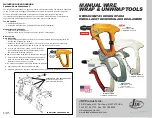
English
33
NOTE:
䡬
Please use the minimum air pressure that is sufficient
to drive the nails to a suitable depth. If an overly high
pressure is used, the life of the piston damper etc.
will be shortened.
INSPECTION AND MAINTENANCE
CAUTION:
Be sure to disconnect the hose during cleaning
jams, inspection, maintenance and cleaning.
1. Countermeasure for nail jamming
(1) Remove the nail oil roll from the magazine, open the
nail guide, insert a rod into the nail outlet and tap the
rod with a hammer. (
Fig. 9
).
(2) Remove the jammed nail with
.
screw driver. (
Fig.
10
)
(3) Cut off the defective part of the steel wire which links
the nails with cutting nippers, correct the deformation,
then load the nail roll in the magazine.
(4) In case of frequent jam, consult the Authorized Service
Agent from which you bought this machine.
2. Inspection and maintenance
Periodically inspect the device.
(1) Remove the four hexagon socket hd. bolts securing
the exhaust cover and remove the exhaust cover.
Then, cylinder, piston, and other parts can be removed
in respective assembly groups.
Wipe the drive bit, the piston sliding part and the body
interior with a cloth to remove deposited dirt.
(2) Confirm that the piston damper offers normal
operation. A damaged piston damper may cause
damage to other component parts.
(3) Carefully check the O-ring for wear while
disassembling. A worn or damaged O-ring may
deteriorate overall performance. Replace a worn or
damaged O-ring with new one.
(4) Prior to reassembling the device, apply grease
(Attolub No. 2 Grease) to the O-ring. Also, lubricate
the device with the recommended oil.
3. Check on mounting screws for each part
At regular intervals check every part for loose
mounting screws and whether or not there are any
air leaks. Retighten any loose screws. Operating the
equipment with loose screws untightened will incur
a hazard.
4. Inspecting the drive bit
If the top end of the drive bit is slightly rounded to an
extent that nail heads slightly float above the work
surface, or the nails are often bent, remove the drive
bit and finish off the top end with a file or grinder.
(1) Removing procedures
(a) Remove four hexagon socket hd. bolts to
disassemble the exhaust cover, whereby the
piston is exposed. (See
Fig. 11
)
(b) Insert an appropriate rod into the nail outlet to
withdraw the piston from the opposite side. (See
Fig. 12
)
(2) Grinding procedures
(a) When grinding the top end by using a grinder, to
avoid wear, gradually grind it while cooling the
grinding part with water. Excessive grinding may
shorten the Nailer service life.
(b) If nail heads still float above the work surface even
though the top end is ground, replace the drive
bit with a new bit. (Replace the drive bit when
projection beyond the top of tail cover is reduced
to approximately 6 mm.) Drive bits are available
from the dealer where you ordered the nailer.
(3) Reassembling procedures
Effect reassembling procedures in reverse order to
those of disassembling. Insert the drive bit with the
semicircular groove side facing the handle side.
Confirm that the drive bit is fully inserted the nail
outlet. Then reassemble the exhaust cover. Finally
apply a thin coat of grease (Attolub No. 2 Grease) to
the O-ring and interior surface of the cylinder. (See
Fig. 13
)
CAUTION:
䡬
A cracked drive bit may cause damage. Prior to
reassembling the drive bit, be sure to check for such
cracks.
5. Inspecting the piston
A depletion of cylinder oil or a worn O-ring may restrict
smooth operation. In such instances remove the
piston as illustrated in
Figs. 11, 12
and
13
and clean
the cylinder interior. Then apply 2cc of the
recommended oil over the cylinder interior surface. If
the piston still refuses to offer smooth operation,
replace the worn O-ring.
Also, apply a thin coat of grease (Attolub No. 2 Grease)
to the cylinder interior and the O-ring.
CAUTION:
䡬
Never clean the O-ring with gasoline, thinner, or
similar substance.
6. Inspecting the feeders
(1) Occasionally clean the knob sliding part and then
apply the recommended oil. (See
Fig. 14
)
(2) Open the nail guide and remove dust, etc., as shown
in
Fig. 15
. Apply lubricant to the sliding groove of the
feeder and feeder shaft. Check the main nail stopper
and sub nail stopper slide smoothly by pushing them
with your finger.
(3) Also, apply the recommended oil to the feeding
surface of the nose and nail guide after cleaning. This
promotes smooth operation and retards corrosion.
CAUTION:
Check for smooth movement of the feeders and
stoppers before use. If movement is uneven, nails
could be fired at an irregular angle, presenting a
hazard to the operator and others nearby.
7. Service parts list
A : Item No.
B : Code No.
C : No. Used
D : Remarks
CAUTION:
Repair, modification and inspection of Hitachi Power
Tools must be carried out by an Hitachi Authorized
Service Center.
This Parts List will be helpful if presented with the
tool to the Hitachi Authorized Service Center when
requesting repair or other maintenance.
In the operation and maintenance of power tools, the
safety regulations and standards prescribed in each
country must be observed.





































